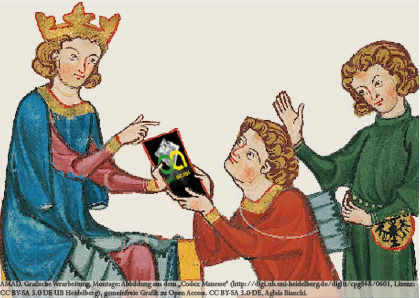AMAD
„Archivum Medii Aevi Digitale - Interdisziplinäres Open-Access-Fachrepositorium und Wissenschaftsblog für Mittelalterforschung‟Zur Einreichung

Langanzeige der Metadaten
| DC Element | Wert | Sprache |
|---|---|---|
| Datum | 2018 | - |
| Quelle | http://epub.oeaw.ac.at/?arp=8441-6inhalt/080_medievalworlds8_li.pdf | - |
| Quelle | https://doi.org/10.1553/medievalworlds_no8_2018s109 | - |
| URI | https://www.amad.org/jspui/handle/123456789/76623 | - |
| Beschreibung | The geopolitics pertaining to the Silk Road network in the period from the 6th to the 7th century (the final, albeit important, period of Late Antiquity) was intertwined with highly strategic dimensions. The frequent arrival of hoards of nomadic peoples from inner Eurasia at the borders of the existing sedentary empires and their encounters and interactions formed the complicated political ecology of the period. These empires attempted to take advantage of the newly shaped situation arising after such great movements strategically, each in their own interest. How did they achieve their goals and what problems were they confronted with? In this paper, I will focus on the relations the Western Türks had with Byzantium and use it as an example in order to resurvey these complicated geopolitics. In the first part, attention will be given to the collection of Byzantine literature concerning the Western Türks. Then, on the basis of the sources, the four main exchanges of delegations between the Western Türks and Byzantium will be discussed, in which the important status of the 563 embassy – as it was the first Türk delegation sent to Byzantium – will be emphasized. The possible motives behind the dispatch of the delegations and the repercussions they had will be presented. Finally, through reviewing the diplomatic communication between the Western Türks and Byzantium, attention will be turned to the general picture of geopolitics along the Silk Road, claiming that the great empire of the West – similar to today’s superpowers – by means of their resources (mainly diplomacy) manipulated the geopolitics on the Silk Road, especially the nomadic people pursuing their own survival and interests, who were only treated as pieces on a chessboard for keeping the balance with the rest of the superpowers. | - |
| Format | application/pdf | - |
| Sprache | eng | - |
| Rechte | info:eu-repo/semantics/openAccess | - |
| Schlagwörter | Western Türks; Byzantium; Geopolitics; Diplomacy; Nomads; Silk Road,Mittelalter | - |
| Dewey-Dezimalklassifikation | 940 | - |
| Titel | The Geopolitics on the Silk Road: Resurveying the Relationship of the Western Türks with Byzantium through Their Diplomatic Communications. Medieval Worlds|Transcultural Contacts and Literary Exchanges - Volume 8. 2018 medieval worlds Volume 8. 2018| | - |
| Typ | journal | - |
| AMAD ID | 520450 | - |
| Jahr | 2018 | - |
| Open Access | 1 | - |
| Enthalten in den Sammlungen: | BASE (Bielefeld Academic Search Engine) General history of Europe | |
Dateien zu dieser Ressource:
Es gibt keine Dateien zu dieser Ressource.
Alle Ressourcen in diesem Repository sind urheberrechtlich geschützt, soweit nicht anderweitig angezeigt.

